新目标英语七年级上unit5 Do you have a soccer ballA-1a-2c课件
英语人教新目标七年级上册Unit 5 Do you have a soccer ball

Competition 比赛
1
A: Do you have a ...?
2
B: Yes, I do. I have a ....
No, I don't. I don't have a..
3
4
5
6
1
A: Do you have a ...?
volleyball ['vɒlɪbɔːl]
play volleyball
baseball
['beɪsbɔːl]
晶晶
play baseball a baseball bat
a tennis ball
['tenɪs]
play tennis
a ping-pong bat
a ping-pong ball
将下列单词与图中物品匹配。
1. tennis ball __a___ 2. ping-pong bat __f___ 3. soccer ball __c___ 4. volleyball __e___ 5. basketball __d___ 6. baseball bat __b___
1b Listen and circle the words you hear.
['piŋpɔŋ]
play ping-pong
Look and say
basketball soccer ball
volleyball
tennis ball baseball ping-pong ball
baseball bat
ping-pong bat
Guessing
新目标初中英语七年级上册Unit 5 Do you have a soccer ball?单元教学设计

Unit 5 Do you have a soccer ball?单元整体说明单元教材分析本单元主要学习动词have的一般现在时的用法;使用do和does引导的一般疑问句的构成以及简单回答。
本单元围绕“和朋友一起欢度时光”这一话题安排了三个任务:一是列举所学的运动项目,从中挑选出各自喜欢的体育项目,并说明原因,目的是巩固并新学一些体育项目的名词;二是让学生互相询问所爱好的运动,并根据情况发出邀请,学会用have对物品的所属进行提问与回答,掌握用do和does引导的一般疑问句的构成及使用,了解用Le t’s提建议的句型;三是写作,把任务一、二的完成情况写成日记,进一步复习、巩固所学的语言目标。
Do you/they have a TV? Yes,I/they do./No,I/they don’t.Does he/she have a soccer ball? Yes,he/she does./No,he/she doesn’t.Let’s play soccer.I don’t have a soccer ball./That sounds good.单元总体目标学会用have对物品的所属进行提问与回答;学会用let’s…句型提建议;能够谈论自己喜欢哪些球类运动,不喜欢哪些球类运动及原因;能够谈论怎样和自己的朋友度过一段愉快的时光重点难点1.复习词汇:baseball soccer ball, have2.词汇:tennis, racket, bat, volley, basketball, television, interesting, boring, fun, difficult, relaxing, welcome, our, sports, center, like, we, many, club, pingpong, more, join, class3.句型:Do you have a TV? Yes, I do. /No, I don’t.Do they have computer? Yes, they do. / No, they don’t.Does he /she have a soccer ball? Yes, he/she does. No, he/she doesn’t.Does Chi young have a baseball? Yes, he do es. No, he doesn’t.Let’s play soccer. I don’t have a soccer ball.Well, Let’s play volleyball. That sounds good.语法重点:行为动词have的一般现在时的用法;使用do和does引导的一般疑问句的构成和使用。
新目标英语七年级上unit_5_Do_you_have_a_soccer_ball(全课件)
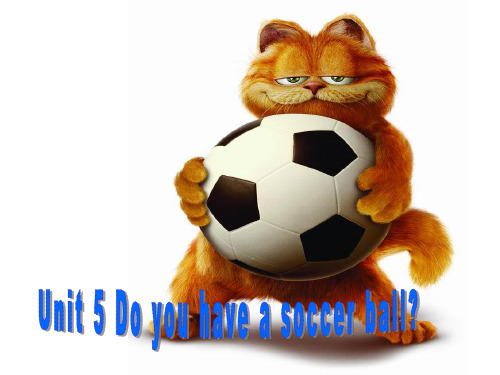
1
4
2
5
3
6
Let’s play sports! Do you play tennis? Do you play volleyball? We have many sports clubs: basketball, ping-pong, soccer, and more!
1) play sports
B: That sounds good.
A: Let’s(让咱们) play volleyball. B: I don’t have a volleyball. A: Well, let’s play soccer. B: That sounds good/interesting/fun…
Do you have a basketball?
Does he have a/an…? Yes, he does. No, he doesn’t.
Does she have a …? Yes, she does. No, she doesn’t .
Does he have a …? Yes, he does.
No, he doesn’t.
Let’s play soccer. I don’t have a soccer ball. Let’s play … That sounds good.
Let’s play basketball.
Let’s play ping-pong. Let’s play tennis.
Let’s play baseball.
A: Let’s play basketball. (let’s=let us) B: I don’t have a basketball. A: Well, let’s play ping-pong.
Unit 5 Do you have a soccer ball 知识点归纳-七年级上册英语

人教版新目标七上英语单元知识点归纳Unit 5 Do you have a soccer ball?重点词汇tennis/'tenis/ n. 网球bat /bæt/ n. 球棒;球拍soccer ball (英式)足球volleyball/'vɔlibɔ:l/ n. 排球basketball/'ba:skitbɔ:l/ n. 篮球late/leit/ adj. 迟到great/greit/ adj. 美妙的;伟大的play/plei/ v. 参加(比赛或运动);玩耍sound/saund/ v. 听起来好像interesting/'intrəstiŋ/ adj. 有趣的boring/'bɔ:riŋ/ adj. 没趣的;令人厌倦的fun/fʌn/ adj. 有趣的;使人快乐的n.乐趣;快乐difficult/'difikəlt/ adj. 困难的relaxing/ri'læksiŋ/ adj. 轻松的;令人放松的watch/wɔtʃ/ v. 注视;观看same/seim/ adj. 相同的easy/'i:zi/ adj. 容易的;不费力的class/kla:s/ n. 班级;课classmate/'kla:smeit/ n. 同班同学重点短语:a tennis bat 一个网球拍play basketball 打篮球baseball bat 棒球棒have a soccer ball 有一个足球play soccer 踢足球with our friends 和我们的朋友一起have a ping-pong ball 有一个乒乓球play ping-pong 打乒乓球have a volleyball 有一个排球play volleyball 打排球at school 在校,上学play sports 做运动watch TV 看电视in my bag 在我的包里be late 迟到on TV 电视上必背典句:1. Do you have a soccer ball? 你有一个足球吗?2. Does he/she have a ping-pong ball?他/她有一个乒乓球吗?3. Do you play sports with your classmates? 你和你的同学一起做运动吗?4. Let’s play soccer together! 我们一起踢足球吧!5. How many sports do you like?你喜欢多少种运动?6. I like playing soccer and basketball. 我喜欢踢足球和打篮球。
新目标七年级英语上Unit5Doyouhaveasoccerb

新目标七年级英语上Unit5Do you have a soccer ball?同步学案Unit5Do you have a soccer ball?一、单词导航台1.boring adj.令人厌烦的,乏味的,无聊的2.basketballn.篮球【考点】指球类运动时,其前不加任何冠词。
3.Bath n.洗澡:He has a bath once a week.他每周洗一次澡。
【考点】have a bath洗澡。
【引申】Bath巴斯(英国城市);bathroom浴室,澡堂;bathrobe浴衣,bathtub浴缸。
4.Volleyball n.排球,排球运动【记忆法】volley(球赛中在球落地前击回)+ball(球)。
【考点】play volleyball打排球。
5.Interesting adj.有趣味的,有意思的【记忆法】interest+ing(动词的现在分词形式作形容词)。
【引申】同义词:attractive,entertaining;反义词:boring,dull。
6.Fun n.有趣的事,说笑,娱乐:He is full of fun.他很风趣。
【考点】make fun of取笑,开玩笑:They are making fun of the little boy.他们和那个小男孩开玩笑。
in fun开玩笑地,非认真的:He said it in fun.他只是说着玩的。
【引申】同义词:enjoyment,game,play。
fun-loving爱开玩笑的。
7.Difficult adj.难的,困难的:The place is difficult to reach.那个处所不易到达。
【考点】It is difficult(for sb.)to do sth…(对某人来说)做……是难的:It is difficult(for me)to learn English.(对我来说)学习英语很难。
新目标英语七年级上Unit5Doyouhaveasoccerball
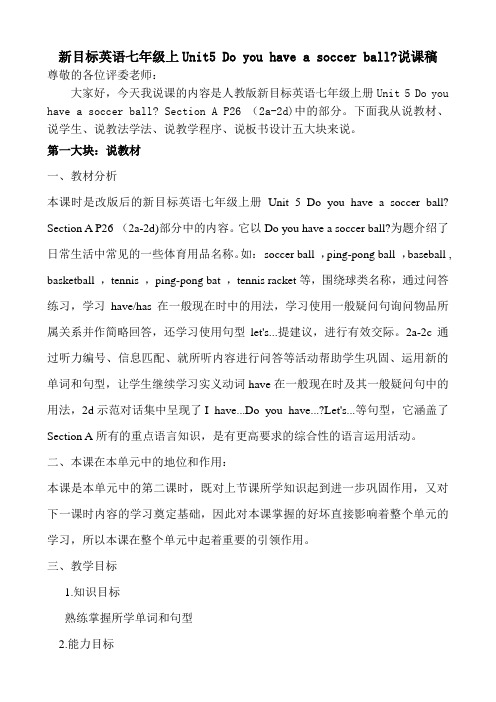
新目标英语七年级上Unit5 Do you have a soccer ball?说课稿尊敬的各位评委老师:大家好,今天我说课的内容是人教版新目标英语七年级上册Unit 5 Do you have a soccer ball? Section A P26 (2a-2d)中的部分。
下面我从说教材、说学生、说教法学法、说教学程序、说板书设计五大块来说。
第一大块:说教材一、教材分析本课时是改版后的新目标英语七年级上册Unit 5 Do you have a soccer ball? Section A P26 (2a-2d)部分中的内容。
它以Do you have a soccer ball?为题介绍了日常生活中常见的一些体育用品名称。
如:soccer ball ,ping-pong ball ,baseball , basketball ,tennis ,ping-pong bat ,tennis racket等,围绕球类名称,通过问答练习,学习have/has在一般现在时中的用法,学习使用一般疑问句询问物品所属关系并作简略回答,还学习使用句型let's...提建议,进行有效交际。
2a-2c通过听力编号、信息匹配、就所听内容进行问答等活动帮助学生巩固、运用新的单词和句型,让学生继续学习实义动词have在一般现在时及其一般疑问句中的用法,2d示范对话集中呈现了I have...Do you have...?Let's...等句型,它涵盖了Section A所有的重点语言知识,是有更高要求的综合性的语言运用活动。
二、本课在本单元中的地位和作用:本课是本单元中的第二课时,既对上节课所学知识起到进一步巩固作用,又对下一课时内容的学习奠定基础,因此对本课掌握的好坏直接影响着整个单元的学习,所以本课在整个单元中起着重要的引领作用。
三、教学目标1.知识目标熟练掌握所学单词和句型2.能力目标A能够正确使用have/has的一般现在时用法。
人教新目标七年级上册英语Unit 5 Do you have a soccer ball知识点汇总

人教新目标七年级上册英语Unit 5 Do you have a soccer ball?知识点汇总第一课时:Section A ---Grammar focus.一、重点词汇:1. have v. 有(用于第一人称(I,we),第二人称(you),以及第三人称复数(they或其他复数名词等);has用于第三人称单数(he,she,it或单数名词)。
如:I/ We/ You/ They/ The boys have an orange. 我有一个橘子。
He/ She / It/ Tom has a Chinese friend. 汤姆有一位中国朋友。
2. tennis n.网球3. volleyball n.排球4. basketball n. 篮球*5. ping-pong bat 乒乓球拍tennis bat 网球拍*6. play v. 名词为:player 指队员,play 后加球类、棋牌类。
E.g.: play soccer/ chess.*7.do v. 实意动词,又称行为动词,意为“做”,例如:do homework; 单三为does,do 又可作为助动词,帮助实意动词构成疑问句或否定句,主语第三人称单数时,用does.二、重点词组:1. play basketball / soccer / tennis / ping-pong 打篮球/ 踢足/ 网球/打乒乓球/打排球;常与play搭配的动词短语还有:play cards打牌play chess 下象棋,中间不加the;*而表示“弹钢琴、拉小提琴”等乐器前,一定要加上定冠词the,其结构为:play +the +乐器。
如:play the piano弹钢琴play the flute吹笛子play the violin拉小提琴;*play with “玩……”,如:The boys are playing with the ball.2. play computer games 玩电脑游戏*3. ping-pong bat 乒乓球拍tennis bat 网球拍三、重点句型及句子:Do you have a ping-pong bat? Yes, I do. / No, I don’t.这是一个一般现在时的一般疑问句,其肯定句为I have a ping-pong ball. 其中,have为实意动词,意为“有”。
七年级英语上册《Unit 5 Do you have a soccer ball》知识点 (新版)人教新目标版
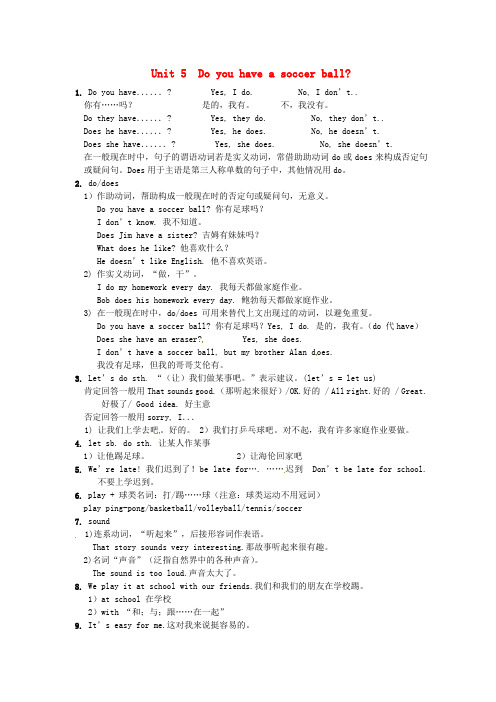
Unit 5 Do you have a soccer ball?1. Do you have......? Yes, I do. No, I don’t..你有……吗?是的,我有。
不,我没有。
Do they have......? Yes, they do. No, they don’t..Does he have......? Yes, he does. No, he doesn’t.Does she have......? Yes, she does. No, she doesn’t.在一般现在时中,句子的谓语动词若是实义动词,常借助助动词do或does来构成否定句或疑问句。
Does用于主语是第三人称单数的句子中,其他情况用do。
2. do/does1)作助动词,帮助构成一般现在时的否定句或疑问句,无意义。
Do you have a soccer ball? 你有足球吗?I d on’t know. 我不知道。
Does Jim have a sister? 吉姆有妹妹吗?What does he like? 他喜欢什么?He doesn’t like English. 他不喜欢英语。
2) 作实义动词,“做,干”。
I do my homework every day. 我每天都做家庭作业。
Bob does his homework every day. 鲍勃每天都做家庭作业。
3) 在一般现在时中,do/does 可用来替代上文出现过的动词,以避免重复。
Do you have a soccer ball? 你有足球吗?Yes, I do. 是的,我有。
(do 代have)Does she have an eraser? Yes, she does.I don’t have a soccer ball, but my brother Alan d oes.我没有足球,但我的哥哥艾伦有。
3.Let’s do sth. “(让)我们做某事吧。
新目标英语七年级上unit5_Do_you_have_a_soccer_ball

Do you have ….? Do we have ….? Do they have ….?
Yes, I do. Yes, we do . Yes, they do. No, I don’t. No, we don’t. No, they don’t. Yes, he does. Yes, she does No, he doesn’t. No, she doesn’t.
does . Yes, he _______
She is Mary, She has a tennis _______and a tennis racke_ not _______ have a volleyball.
They are Tom and his father. have a They ______ baseball bat. Do they ______ have a ______ baseball? don’t No, they _______.
Does she have … ?
Does she have … ?
Does she have … ?
A: Does she have …? B: Yes, she does. /No, she doesn’t.
A: Does he have … ? B: Yes, he does. /No, he doesn’t.
___you _____ Do have a computer? Yes, I_______. do I ______ have a computer
√
___you _____ Do have a ruler?
don’t No, I _______.
have a ruler. I don’t __________
人教(新目标)初中英语七年级上册 Unit 5 Do you have a soccer ball

Let’s play baseball.
Look at the pictures and make sentences.看图造句 e.g. Let’s play soccer
Let’s play volleyball. That sounds boring.
Let’s play soccer. Let’s play basketbal That sounds fun. That sounds relaxing
interesting
有趣的, 令人感兴趣的
Woo! It’s interesting.
fun
有趣的, 令人愉快的
Haha, it’s fun.
轻松的
relaxing
Ah! It’s relaxing.
difficult
困难的
968746232978³+78235768²×77869856343³ =
A: Let’s ... B: I don’t have... A: Well, let’s ... B: That sounds good.
×√
1b Listen and check (∨) the description
words you hear in 1a.
a. interesting ∨__ b. boring ∨__ c. difficult ∨__ d. relaxing __ e. fun ∨__
Let’s play baseball.
Let’s play ping-pong.
That sounds interesting. That sounds difficult.
A: Let’s play basketball. B: But I don’t have a basketball. A: Well, let’s play ping-pong. B: That sounds good.
人教版新目标版七年级英语上册Unit5Doyouhaveasoccerball教案
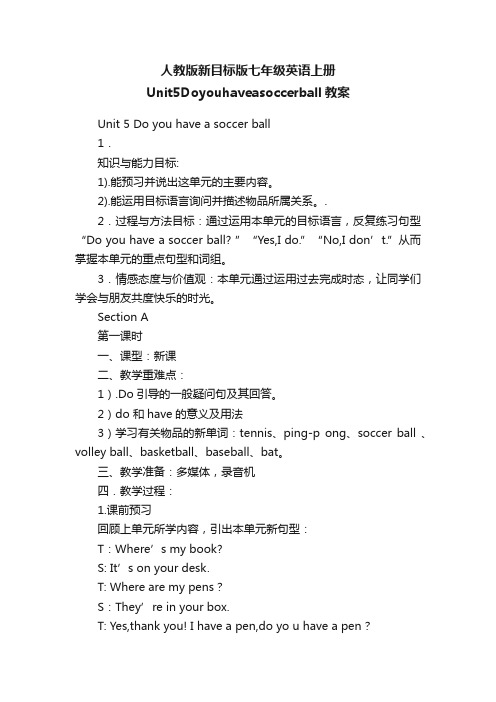
人教版新目标版七年级英语上册Unit5Doyouhaveasoccerball教案Unit 5 Do you have a soccer ball1.知识与能力目标:1).能预习并说出这单元的主要内容。
2).能运用目标语言询问并描述物品所属关系。
.2.过程与方法目标:通过运用本单元的目标语言,反复练习句型“Do you have a soccer ball? ”“Yes,I do.”“No,I don’t.”从而掌握本单元的重点句型和词组。
3.情感态度与价值观:本单元通过运用过去完成时态,让同学们学会与朋友共度快乐的时光。
Section A第一课时一、课型:新课二、教学重难点:1).Do引导的一般疑问句及其回答。
2)do 和have的意义及用法3)学习有关物品的新单词:tennis、ping-p ong、soccer ball 、volley ball、basketball、baseball、bat。
三、教学准备:多媒体,录音机四.教学过程:1.课前预习回顾上单元所学内容,引出本单元新句型:T:Where’s my book?S: It’s on your desk.T: Where are my pens?S:They’re in your box.T: Yes,thank you! I have a pen,do yo u have a pen?S:Yes,I do./No,I don’t.2.正课教授(1)引入①观察25页图片,引入新单词的学习。
②学习do引导的一般疑问句及其肯定回答和否定回答。
have的用法:①have为实义动词,意为“有”,常用句型sb.have/has+sth.表示某人有某物。
当主语为第三人称单数时,have用其第三人称单数形式。
②have还有“吃、喝”的意思,如:have breakfast。
③含有have的句子变否定句要在have前加don’t;含有has的句子变否定句要在h as前加doesn’t,has变为have。
人教新目标七年级英语教案(上)Unit 5 Do you have a soccer ball
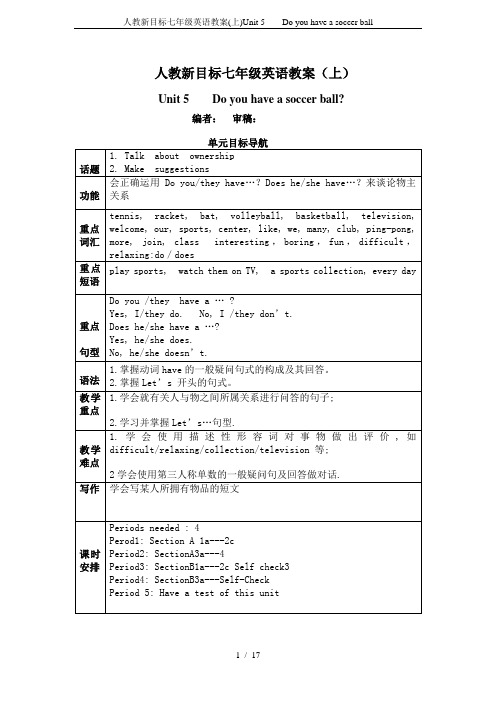
词汇
tennis, racket, bat, volleyball, basketball, television, welcome, our, sports, center, like, we, many, club, ping-pong, more, join, class interesting,boring,fun,difficult,relaxing:do/does
2._______ he ________a baseball? Yes,he_________./No,he__________.
3.________ you _________a computer? N0,I don’t ________one.
4._________the girl have a TV? Yes,she_________ one.
D: Yes, he does. He has a…/ No, he doesn’t. he doesn’t have a …
Step 3.Ask three or four students to answer the questions.
Eg: T: Do you have a…? S1-3: Yes, we do. T: Do they have a…? S(others): Yes, they do. Then practice in groups.
T: Look at the pictures in 2a. they are talking about their sports things. Listen and number the pictures. Then check the answers like this:Peter has a soccer.
人教版新目标版七年级英语上册 Unit 5 Do you have a soccer ball?教案
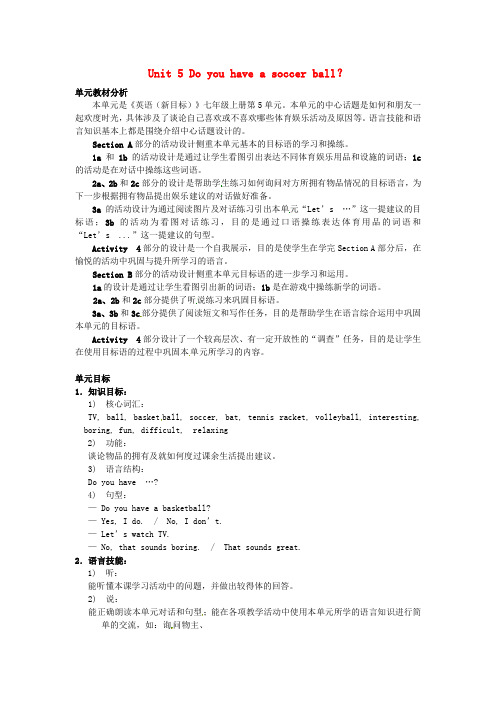
Unit 5 Do you have a soccer ball?单元教材分析本单元是《英语(新目标)》七年级上册第5单元。
本单元的中心话题是如何和朋友一起欢度时光,具体涉及了谈论自己喜欢或不喜欢哪些体育娱乐活动及原因等。
语言技能和语言知识基本上都是围绕介绍中心话题设计的。
Section A部分的活动设计侧重本单元基本的目标语的学习和操练。
1a和1b的活动设计是通过让学生看图引出表达不同体育娱乐用品和设施的词语;1c 的活动是在对话中操练这些词语。
2a、2b和2c部分的设计是帮助学生练习如何询问对方所拥有物品情况的目标语言,为下一步根据拥有物品提出娱乐建议的对话做好准备。
3a的活动设计为通过阅读图片及对话练习引出本单元“Let’s…”这一提建议的目标语;3b的活动为看图对话练习,目的是通过口语操练表达体育用品的词语和“Let’s...”这一提建议的句型。
Activity 4部分的设计是一个自我展示,目的是使学生在学完Section A部分后,在愉悦的活动中巩固与提升所学习的语言。
Section B部分的活动设计侧重本单元目标语的进一步学习和运用。
1a的设计是通过让学生看图引出新的词语;1b是在游戏中操练新学的词语。
2a、2b和2c部分提供了听说练习来巩固目标语。
3a、3b和3c部分提供了阅读短文和写作任务,目的是帮助学生在语言综合运用中巩固本单元的目标语。
Activity 4部分设计了一个较高层次、有一定开放性的“调查”任务,目的是让学生在使用目标语的过程中巩固本单元所学习的内容。
单元目标1.知识目标:1) 核心词汇:TV, ball, basket ball, soccer, bat, tennis racket, volleyball, interesting, boring, fun, difficult, relaxing2) 功能:谈论物品的拥有及就如何度过课余生活提出建议。
3) 语言结构:Do you have …?4) 句型:— Do you have a basketball?— Yes, I do. / No, I don’t.—Let’s watch TV.— No, that sounds boring. / That sounds great.2.语言技能:1) 听:能听懂本课学习活动中的问题,并做出较得体的回答。
七年级英语上册Unit5Doyouhaveasoccerball知识讲解素材人教新目标版
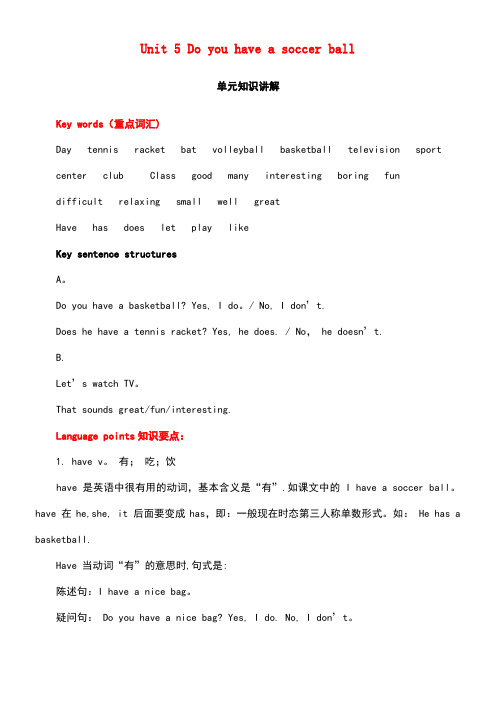
Unit 5 Do you have a soccer ball单元知识讲解Key words(重点词汇)Day tennis racket bat volleyball basketball television sport center club Class good many interesting boring fundifficult relaxing small well greatHave has does let play likeKey sentence structuresA。
Do you have a basketball? Yes, I do。
/ No, I don’t.Does he have a tennis racket? Yes, he does. / No,he doesn’t.B.Let’s watch TV。
That sounds great/fun/interesting.Language points知识要点:1. have v。
有;吃;饮have是英语中很有用的动词,基本含义是“有”.如课文中的I have a soccer ball。
have 在he,she, it 后面要变成has,即:一般现在时态第三人称单数形式。
如: He has a basketball.Have 当动词“有”的意思时,句式是:陈述句:I have a nice bag。
疑问句:Do you have a nice bag? Yes, I do. No, I don’t。
否定句:I don’t have a n ice bag.have与其它的词组合成词组、短语,就不表示有了,其意思与后面的名词接近。
如:have classes(上课);have breakfast(吃早饭);have a good time(玩得高兴);have sports(进行体育活动);have a day off(休假)等等。
新目标版英语七年级上册Unit5Doyouhaveasoccerball?(SetionB).docx
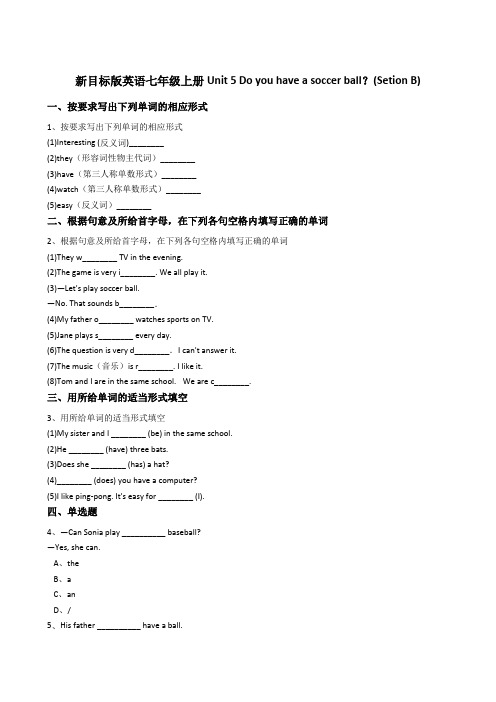
新目标版英语七年级上册Unit 5 Do you have a soccer ball?(Setion B)一、按要求写出下列单词的相应形式1、按要求写出下列单词的相应形式(1)Interesting (反义词)________(2)they(形容词性物主代词)________(3)have(第三人称单数形式)________(4)watch(第三人称单数形式)________(5)easy(反义词)________二、根据句意及所给首字母,在下列各句空格内填写正确的单词2、根据句意及所给首字母,在下列各句空格内填写正确的单词(1)They w________ TV in the evening.(2)The game is very i________. We all play it.(3)—Let's play soccer ball.—No. That sounds b________.(4)My father o________ watches sports on TV.(5)Jane plays s________ every day.(6)The question is very d________.I can't answer it.(7)The music(音乐)is r________. I like it.(8)Tom and I are in the same school. We are c________.三、用所给单词的适当形式填空3、用所给单词的适当形式填空(1)My sister and I ________ (be) in the same school.(2)He ________ (have) three bats.(3)Does she ________ (has) a hat?(4)________ (does) you have a computer?(5)I like ping-pong. It's easy for ________ (I).四、单选题4、—Can Sonia play __________ baseball?—Yes, she can.A、theB、aC、anD、/5、His father __________ have a ball.A、doesn'tB、don'tC、isn'tD、aren't6、They __________ have a mobile phone (手机).A、isn'tB、aren'tC、don'tD、doesn't7、Peter's father often watches basketball games __________ TV.A、inB、onC、atD、for8、—Do you play sports every day?—No, it's __________.A、funB、goodC、boringD、interesting9、English is __________ but __________.A、boring; difficultB、difficult; interestingC、good; niceD、many; more10、He __________ baseball.A、don't playB、doesn't playsC、doesn't playD、don't plays11、He likes watching sports games, __________ he __________ play them.A、and; doesn'tB、but; don'tC、but; doesn'tD、and; don't12、—Let's play computer games.—__________.A、That sounds interestingB、I don't have timeC、Yes, I am busy (忙碌的)D、No, I don't13、—Does he have a table?—__________.A、Yes, he haveB、No, he doC、Yes, he doesD、No, she don't14、My sister ___________ TV every day, but I ___________.A、watch; doB、watches; don'tC、watches; doD、watch; don't15、—Do you ___________ a tennis ball?—Yes, I do.A、doB、haveC、playD、let16、—Do you play soccer ball?—No. I only watch it ___________ TV.A、onB、atC、inD、of17、___________ your brother have a dictionary?A、IsB、AreC、DoesD、Do18、Mr. Black doesn't like the lecture(演讲). It is ___________.A、interestingB、boringC、funD、difficult五、根据所给的单词及标点连词成句19、根据所给的单词及标点连词成句(1)have, don't, soccer, I, ball, a (.)________(2)have, does, tennis, he, a, racket (?)________(3)sounds, that, good (.)________(4)you, do, computer, a, have ( ?)________(5)volleyball, play, let's ( . )________六、阅读理解20、阅读理解Jim: Let's play computer games.Peter: That sounds good. Where's your computer?Jim: I don't have a computer. Do you have a computer? Peter: No, I don't. But I have a TV. Let's watch TV.Jim: No, it's boring. Let's play tennis. I have a tennis racket. Peter: Good. Where is it?Jim: On the sofa. Do you have a racket?Peter: No, I don't. Does your brother have a racket? Jim: Yes, he does. And he has tennis balls.(1)Does Jim have a computer?A、He has no computerB、He has two computers.C、Yes, he does.D、No, he doesn't.(2)Jim has a racket. Where is it?A、It's on the sofa.B、It's near the sofa.C、It's behind the sofa.D、It's under the sofa.(3)Does Peter have a tennis racket?A、Yes, he does.B、He has a tennis racket.C、He has two tennis racketsD、No, he doesn't.(4)Does Jim have a tennis racket?A、Yes, he does.B、No, he doesn't.C、He has two tennis rackets.D、He doesn't have a tennis racket.(5)Does Jim's brother have a tennis racket?A、He doesn't have tennis balls.B、Yes, he does.C、No, he doesn't.D、He has tennis balls.七、按要求转换句子,每空一词21、按要求转换句子,每空一词(1)Does he have a tennis racket? (作否定回答)No, ________ ________.(2)She watches TV every day. (改为否定句)She ________ ________ TV every day.(3)I have a computer game. (改为一般疑问句)________ you ________ a computer game?(4)Ann has a nice basketball. (对画线部分提问)________ ________ Ann ________?(5)We play soccer ball.(改为祈使句)________ ________ soccer ball.八、根据汉语提示完成下面的句子22、根据汉语提示完成下面的句子(1)海伦每天早晨做运动。
七年级英语上册 Unit 5 Do you have a soccer ball讲义 人教新目标版
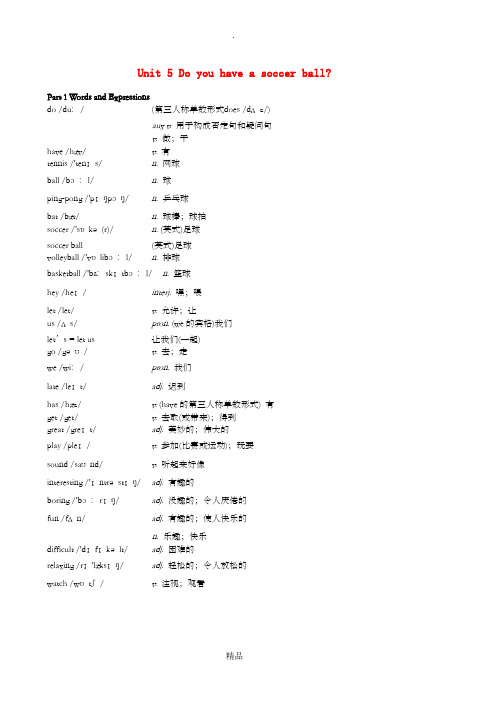
Unit 5 Do you have a soccer ball? Part 1 Words and Expressionsdo /duː/ (第三人称单数形式d oes /dʌz/)aux v. 用于构成否定句和疑问句v. 做;干have /hæv/ v. 有tennis /'tenɪs/ n. 网球ball /bɔːl/ n. 球ping-pong /'pɪŋpɔŋ/ n. 乒乓球bat /bæt/ n. 球棒;球拍soccer /'sɒkə(r)/ n. (英式)足球soccer ball (英式)足球volleyball /'vɒlibɔːl/ n. 排球basketball /'bɑːskɪtbɔːl/ n. 篮球hey /heɪ/ interj. 嘿;喂let /let/ v. 允许;让us /ʌs/ pron. (we 的宾格)我们let’s = let us 让我们(一起)go /gəʊ/ v. 去;走we /wiː/ pron. 我们late /leɪt/ adj. 迟到has /hæz/ v. (have 的第三人称单数形式) 有get /get/ v. 去取(或带来);得到great /greɪt/ adj. 美妙的;伟大的play /pleɪ/ v. 参加(比赛或运动);玩耍sound /saʊnd/ v. 听起来好像interesting /'ɪntrəstɪŋ/ adj. 有趣的boring /'bɔːrɪŋ/ adj. 没趣的;令人厌倦的fun /fʌn/ adj. 有趣的;使人快乐的n. 乐趣;快乐difficult /'dɪfɪkəlt/ adj. 困难的relaxing /rɪ'læksɪŋ/ adj. 轻松的;令人放松的watch /wɒtʃ/ v. 注视;观看TV /,tiː'viː/ n. (=television /'telɪvɪʒn/)电视;电视机watch TV 看电视same /seɪm/ adj. 相同的love /lʌv/ v. & n. 爱;喜爱with /wɪð/ prep. 和……在一起;带有;使用sport /spɔː(r)t/ n. 体育运动them /ðəm/ pron. (they 的宾格) 他(她、它)们only /'əʊnli/ adv. 只;仅like /laɪk/ v. 喜欢;喜爱easy /'iːzi/ adj. 容易的;不费力的after /'ɑːftə(r)/ prep. & conj. 在……之后class /klɑːs/ n. 班级;课classmate /'klɑːsmeɪt/ n. 同班同学Bill /bɪl/ 比尔(男名)Part 2:Texts课文(一)Cindy: Hey, Helen, let’s go! We’re late!Helen: OK.Cindy: Do you have the baseball? Helen: Y es,I do. It’s in my bag. Cindy: And where’sour baseball bat? Helen: Bill has it.Cindy: Oh, yeah. And do you have your jacket? Helen: Oh, no, I don’t. It’s on the chair. Let me get it. Cindy: And your hat, too!Helen: OK, I have my jacket and hat. Let’s go!Structure1. Do you have a baseball?Y es, I do./No, I don’t. I have a volleyball.2. Do you have a ping-pong bat?Y es, I do./No, I don’t. I have a ping-pong ball.3. Does she have a tennis ball?Y es, she does./No, she doesn’t. She has a baseball.4. Does he have a soccer ball?Y es, he does./No. he doesn’t. He has two ping-pong bats.5. Do they have a basketball?Y es, they do./No, they don’t. They have a volleyball.don’t = do not doesn’t = does not句型:—Do/Does sb. have…?—Y es, sb. do / does.—No, sb. don’t / doesn’t.Write each word in the correct place in the chart.将方框中的单词填入表格中正确的位置。
七年级上英语新目标精讲精析Unit5Doyouhaveasoccerball
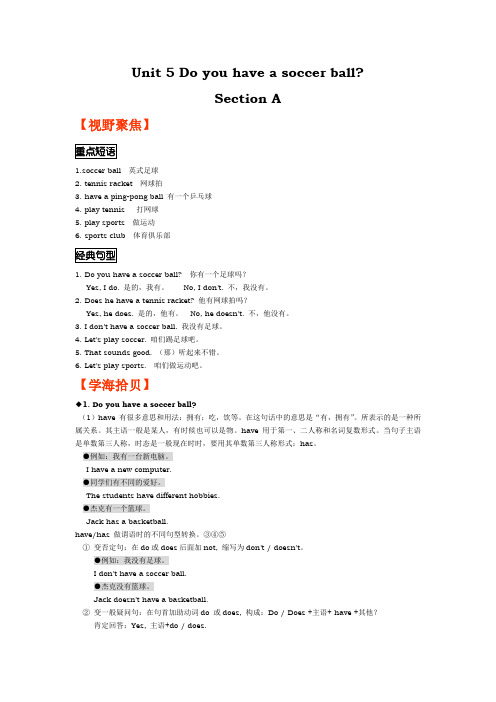
Unit 5 Do you have a soccer ball?Section A【视野聚焦】1.soccer ball 英式足球2. tennis racket 网球拍3. have a ping-pong ball 有一个乒乓球4. play tennis 打网球5. play sports 做运动6. sports club 体育俱乐部1. Do you have a soccer ball? 你有一个足球吗?Yes, I do. 是的,我有。
No, I don’t. 不,我没有。
2. Does he have a tennis racket? 他有网球拍吗?Yes, he does. 是的,他有。
No, he doesn’t. 不,他没有。
3. I don’t have a soccer ball. 我没有足球。
4. Let’s play soccer. 咱们踢足球吧。
5. That sounds good. (那)听起来不错。
6. Let’s play sports. 咱们做运动吧。
【学海拾贝】◆1. Do you have a soccer ball?(1)have 有很多意思和用法:拥有;吃,饮等。
在这句话中的意思是“有,拥有”。
所表示的是一种所属关系。
其主语一般是某人,有时候也可以是物。
have 用于第一、二人称和名词复数形式。
当句子主语是单数第三人称,时态是一般现在时时,要用其单数第三人称形式:has。
●例如:我有一台新电脑。
I have a new computer.●同学们有不同的爱好。
The students have different hobbies.●杰克有一个篮球。
Jack has a basketball.have/has 做谓语时的不同句型转换。
③④⑤①变否定句:在do或does后面加not, 缩写为don’t / doesn’t。
●例如:我没有足球。
I don’t have a soccer ball.●杰克没有篮球。
- 1、下载文档前请自行甄别文档内容的完整性,平台不提供额外的编辑、内容补充、找答案等附加服务。
- 2、"仅部分预览"的文档,不可在线预览部分如存在完整性等问题,可反馈申请退款(可完整预览的文档不适用该条件!)。
- 3、如文档侵犯您的权益,请联系客服反馈,我们会尽快为您处理(人工客服工作时间:9:00-18:30)。
• I don’t have a soccer ball.
没 有
A: Do you have a ____?
B: Yes, I do. I have a ____. /No, I don’t. I don’t have a ___.
Eileen’s things:
A: Do you have…?
I want to play basketball? Do you have a basketball? Yes, I do.
Great! 太棒了
Let's play tennis. Do you have a tennis ball? Sorry, I don't.
play volleyball
根据汉语提示完成句子。
1. 你有一只棒球拍吗? Do you ______ have a baseball _____? bat _____ 2. 埃里克有一个网球吗? Does Eric ______ have a _______ tennis ball? _____ 3. 戴尔有一个足球和一个排球。 has a ______ soccer ball and a _________. volleyball Dale _____ 4. 我有一个篮球和一只乒乓球拍。 have a _________ basketball and a ping pong ____. bat I _____
a soccer ball
Do you have a soccer ball? Yes,I do.
I’ve a soccer ball
有
•Have有 .
• I’ve a baseball.
Do you have a baseball? Yes, I do.
Do you have a soccer ball? No,I don't.
Does Dale have a soccer ball? Yes,--- ---.
Dale has a soccer ball. Dale
I don't have a ping-pong bat.
---you --- a ping pong bat? No,--- ---.
ping-pong bat
3.Let’s play tennis. Do you have
___________, a tennis ball Jane?
4.A: Do you have a volleyball, Dale?
B: No, I don’t. But my brother does.
________ Let’s go and find him.
play soccer
play basketball
Let’s play ping-pong . Let’s play tennis.
Let’s play baseball.
听力训练: 2a •Listen and number the pictures:
Jane Paul
Dale
3 1 4 2
B: No, I don’t.
A: Do you have…?
B: Yes, I do.
1 Match the words with the things in the picture. 将下列词语与图中物品匹配。 1.tennis ball___a 2.ping-pong bat ___ f 3.soccer ball____ c 4.volleyball_____ e 5.basketball_____ d
Unit 5
Do you have a soccer ball? Section A
1a-2c
What’s missing?
soccer ball baseball
tennis racket volleyball
tennis ball ping-pong ball basketball ping-pong bat
6.baseball bat ____ b
Listen and circle the words you hear. 听录音,圈出你听到的单词。 1b
• ping-pong bat • soccer ball • volleyball
• Ping-pong ball
Guessing game:
Does he have a …?
--- you ---- a baseball? Yes, --- ---. I have a baseball.
A: Let’s play volleyball. B: No. I don’t have a volleyball. A: Well, let’s play soccer. B: That sounds good.
Yes, he does.
He has a
basketball.
Guessing game:
Does she have a…?
Yes, she does.
She has a ping-pong ball.
Does Mike have a basketball? Yes, --- ---.
Mike Mike has a basketball
Mike
2b Listen again. Match the pictures in2a with the balls.
2
1 4
3
再听一遍,把下列信息补充完整。
1.Does your_______Alan have one? brother 2.I want to play basketball. Do you have___________? a basketball
have 1)I________(have ) a pen . have 2)Does he _______(have ) a book? he doesn’t No,______________. doesn’t have 3)Jim______________(not have ) a pen. have Do they _______(have) 4)____ soccer balls? they do. Yes,_________
